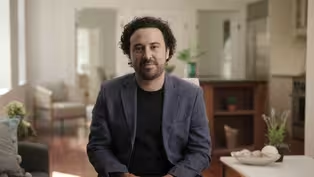
Physician discusses demand for weight-loss drugs and risks
Clip: 12/28/2023 | 7m 59sVideo has Closed Captions
Physician discusses surge in demand for weight-loss drugs and risks in using them
One of the biggest health stories of this past year is the surge in demand for popular weight-loss drugs like Ozempic and Wegovy. Those drugs are in such demand that there’s a nationwide shortage of them. Pharmaceutical companies are scrambling to keep up at a time of rising obesity rates in the U.S. Ali Rogin reports.
Problems playing video? | Closed Captioning Feedback
Problems playing video? | Closed Captioning Feedback
Major corporate funding for the PBS News Hour is provided by BDO, BNSF, Consumer Cellular, American Cruise Lines, and Raymond James. Funding for the PBS NewsHour Weekend is provided by...

Physician discusses demand for weight-loss drugs and risks
Clip: 12/28/2023 | 7m 59sVideo has Closed Captions
One of the biggest health stories of this past year is the surge in demand for popular weight-loss drugs like Ozempic and Wegovy. Those drugs are in such demand that there’s a nationwide shortage of them. Pharmaceutical companies are scrambling to keep up at a time of rising obesity rates in the U.S. Ali Rogin reports.
Problems playing video? | Closed Captioning Feedback
How to Watch PBS News Hour
PBS News Hour is available to stream on pbs.org and the free PBS App, available on iPhone, Apple TV, Android TV, Android smartphones, Amazon Fire TV, Amazon Fire Tablet, Roku, Samsung Smart TV, and Vizio.
Providing Support for PBS.org
Learn Moreabout PBS online sponsorshipdemand for popular weight loss# drugs like Ozempic and Wegovy.
In fact, those drugs are in such demand,# there's a nationwide shortage of them.## Pharmaceutical companies# are scrambling to keep up.
Ali Rogin has a look at the demand and the# questions lots ALI ROGIN: Government surveys show that as much as## 40 percent of the U.S. population in 22 states, at least 35 percent of adults# are obese, mostly in the South and Midwest.
Medications, including the latest FDA-approved# drug Zepbound from Lilly, provide hope to patients## looking for sustainable weight loss, but they# also raise questions related to high costs,## insurance coverage and long-term# effectiveness.
Depending on the## drug and insurance, they can cost patients# thousands of dollars a year to stay And research suggests people may need to# stay on them to maintain that weight loss.
To help look at some of these concerns,# I'm joined by Katherine Saunders.
She's## an assistant professor of clinical# medicine at Weill Cornell Medicine and## specialist in obesity and weight-related medical# complications at New York Presby Dr. Saunders, thank you so much for joining us.
You prescribe these medications to your# tr eatment plans.
And I want to talk about# all of that.
Why have these medicati become so popular in recent years?
And# does it have to do with the medical## community's rethinking of what factors# contribute to obesity in some cases?
DR. KATHERINE SAUNDERS, Assistant Professor of# Clinical Medicine, Weill Cornell Medicine: Yes, so## tw One is tha the most effective anti-obesity medications were# associated with 5 percent to 10 percen body weight loss, which is absolutely what# we consider to be clinically significant.
If you think about any diet# or any behavioral intervention## being associated with 3 percent# weight loss, on average, 3 to 5,## 5 to 10 was pretty good back then.
But the# medications that have come out over the last## few years are considerably more effective,# at 15 percent and now upwards of 22 percent.
So, one is the increase in efficacy# in the studies and effectiveness that## we're seeing among our patients.
And two# is that there's greater recognition that## obesity is a disease that requires medical# management for the vast majority of people## to effectively lose weight and then, more# importantly, keep that weight off long term.
ALI ROGIN: And what are some of the risks that# are associated with being on these medications?
DR. KATHERINE SAUNDERS: So, each of the# medications has its own risk-benefit profile.
Our typical patient has lost and gained weight# so many times over the years that they come t us saying: I have been so successful# in so many other aspects of my life,## and I just absolutely cannot# lose weight and keep it off.
So, for somebody like that, who has had a very# difficult time losing weight with nonme intervention, the risk-benefit profile is really# different.
So if you take a look at nausea,## reflux, constipation, those are the# main complications that we're seeing## with GLP-1-type medications.
It's# a different risk-benefit profile.
We can absolutely do so much in terms of dietary# management, behavioral change to mitigate those## side effects.
So the hype that we're seeing is# because patients are either on too high a dose,## they're inappropriate candidates.# But those side effects generally,## if you weigh the risk-benefit profile# of having untreated obesity relate so many other health complications, for# each person, it's an individual decision.
ALI ROGIN: You have talked about# the importance of coming up with## a detailed treatment plan with your patient looking with them to see if other interventions# might work Why are those things so important.# And are you concerned that right now## doctors may be overprescribing these medications?
DR. KATHERINE SAUNDERS: Yes, I# think that's a fabulous questi There is such a tendency that we're seeing patient with obesity and say, oh, I have a# medication that can finally help you lose## weight.
Here's a prescription for one of the# medications without the appropriate education## and support and the associated required# lifestyle interventions like diet exercise,## behavioral change that are really necessary# for comprehensive obesity treatment.
So, it's really not just about one medication to# as many people as can be taking this medication.## It's really about seeing each patient as an# individual, doing a very thorough evaluation## of everything in their history, everything in# their medical conditions that are leading to## weight gain, everything preventing weight# loss, and then optimizing lifestyle.
ALI ROGIN: There's been a lot# of talk about people who want## to pursue these drugs to reach a goal weight,## and then are planning to get off the drugs and# sustain that goal What is your take on that# approach?
Is that sustainable?
DR. KATHERINE SAUNDERS: So,## we get so ma Obesity is a chronic disease, meaning that# it doesn't just go away, meaning that we,## unfortunately, right now can't cure# it.
Maybe, one day in our lifetime,## we will be able to.
But if you think# about other chronic diseases that you## classically think of as chronic diseases,# like high blood pressure, high cholesterol,## diabetes, people who have these conditions that# are not managed by lifestyle intervention alo expect to start a medication and expect# to stay on that medication long term.
So if they stop that medication, their blood# pressure goes up, their cholesterol goes up, blood sugar goes up.
And we expect that.
With# obesity, there's been this long-held belief that## it's just a lifestyle problem, and that it's such# a massive industry that's really preying on very## vulnerable individuals who are looking for a quick# fix or something that can cure their obesity.
We're not there yet.
So, right now,# when we start a patient on a medication,## it's a long conversation about the need# to take that medication long term.
If## you take a look at their SURMOUNT-4 trial,# which was published in the last few weeks,## this trial showed that, when# people stopped taking Zepbound,## they regained about two-thirds of their# body weight over the next several months.
ALI ROGIN: We mentioned that there are# shortages of many of these medications.
In your opinion, what needs to change about the# availability of these drugs, as them?
Because even for people who can access# them, they might not be able to afford them.
DR. KATHERINE SAUNDERS: Yes.
these medications.
We need better# coverage.
We need the prices to be## lower.
And we need more providers who know how# to prescribe these medications appropriately.
It's interesting that Ozempic, which we were# using before Wegovy came out in 2021, there## really weren't supply issues until Wegovy hit the# market.
Wegovy and Ozempic are the same compound,## just marketed for weight versus diabetes.# And as soon as Wegovy was FDA-approved and## people realized that Ozempic was the same# medication, we started to see shortages.
So, now that Zepbound is approved -- this is# the latest one to be approved last month -- the## medication Mounjaro is the same medication.
And# so Eli Lilly is concerned about shortages of## both of the medications, and they have opened# new facilities in order to increase supply,## so that we don't see what we have been# seeing with Wegovy and the Ozempic shortages.
But the demand is just so# high that it's a big problem.
ALI ROGIN: A big problem and a very hot topic.
Dr. Katherine Saunders with Weill Co thank you so much for your time.
DR. KATHERINE SAUNDERS: Thanks for havi
A Brief But Spectacular take on music empowering communities
Video has Closed Captions
Clip: 12/28/2023 | 3m 15s | A Brief But Spectacular take on how music empowers communities (3m 15s)
How U.S. oil production reached an all-time high in 2023
Video has Closed Captions
Clip: 12/28/2023 | 7m 14s | How U.S. oil production reached an all-time high in 2023 (7m 14s)
Israel and Hezbollah fight raises fears of a wider war
Video has Closed Captions
Clip: 12/28/2023 | 6m | Escalating tensions between Israel and Hezbollah grow fears of wider outbreak of war (6m)
Israeli bombardment of Gaza cities and camps kills dozens
Video has Closed Captions
Clip: 12/28/2023 | 3m 27s | Israeli bombardment of Gaza cities and refugee camps continues, killing dozens (3m 27s)
State ballot measures could drive voter turnout in 2024
Video has Closed Captions
Clip: 12/28/2023 | 4m 35s | State ballot measures in 2024 could drive voter turnout and change the future of elections (4m 35s)
Trump's criminal and civil cases could shape the campaign
Video has Closed Captions
Clip: 12/28/2023 | 5m 45s | How Trump's criminal and civil cases could shape the 2024 campaign (5m 45s)
The war over fake content linked to Israel-Hamas conflict
Video has Closed Captions
Clip: 12/28/2023 | 8m 22s | The online information war over fake content linked to Israel-Hamas conflict (8m 22s)
Providing Support for PBS.org
Learn Moreabout PBS online sponsorship
- News and Public Affairs

FRONTLINE is investigative journalism that questions, explains and changes our world.

- News and Public Affairs

Amanpour and Company features conversations with leaders and decision makers.












Support for PBS provided by:
Major corporate funding for the PBS News Hour is provided by BDO, BNSF, Consumer Cellular, American Cruise Lines, and Raymond James. Funding for the PBS NewsHour Weekend is provided by...






